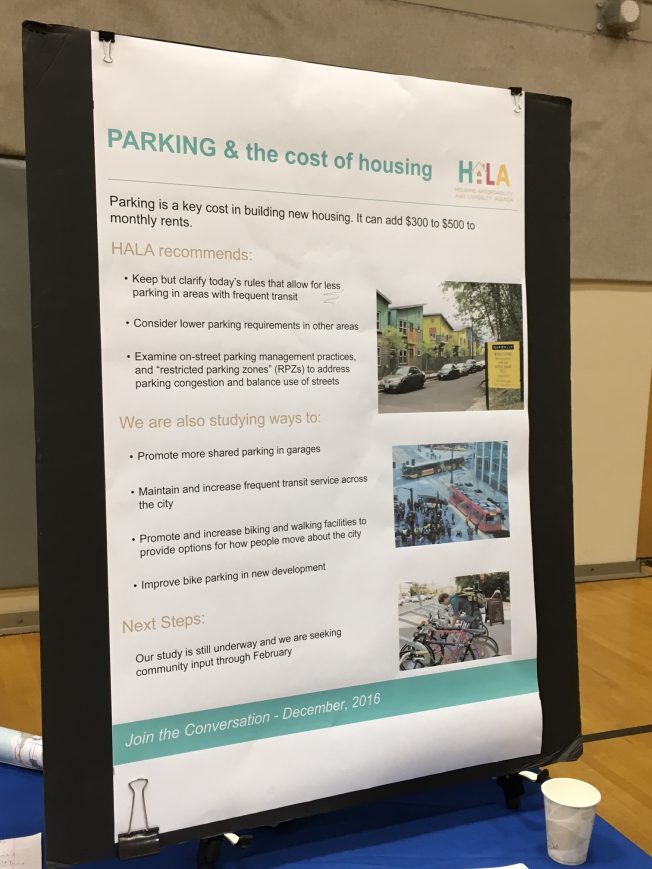 (Easel photographed at one of the city’s HALA-and-more “open houses” last December)
(Easel photographed at one of the city’s HALA-and-more “open houses” last December)
Back in 2012, some were surprised by the city rule change that enabled some development projects to be built without off-street parking, provided they were close to what the city considered “frequent transit service” (FTS). In recent months, the city’s been reviewing that policy and others related to parking – for example, the topic was included in the famously overcrowded HALA-and-more “open house” in The Junction last December and other versions of that event. Today, the city has just announced the results – proposed parking-policy changes. This notice in today’s Land Use Information Bulletin has the documents with all the fine print linked at the top, and then these toplines in the notice itself:
The City of Seattle is proposing to modify parking requirements by amending the Land Use Code (Title 23 SMC), and parking-related environmental policies in Chapter 25.05 of the Environmental Protection and Historic Preservation Code (Title 25 SMC).
The legislation would:
EXPAND ACCESS TO OFF-STREET PARKING
-Create a new use category, “flexible-use parking,” to allow for greater sharing of parking in certain zones, including in: Lowrise 3, Midrise, Highrise, most commercial, and industrial zones; and in mixed-use development garages in light rail station areas.
-Allow park-and-ride facilities within garages as a permitted use in certain zones, including in Lowrise 3, Midrise, Highrise, most commercial, and industrial zones.
-Clarify and update parking provisions by allowing off-site parking to be within one-quarter mile (1,320 feet) of the uses served, up from 800 feet.
OTHER CHANGES IN PARKING REQUIREMENTS
-Clarify and reduce the parking requirements for income-restricted housing, including for the disabled.
-Add a new maximum parking limit for flexible-use parking.
-Delete a special exception allowing more parking than the maximum parking limit in Downtown zones.
-Change the Northgate overlay zone parking provisions to be consistent with the city-wide approach.
-Provide for reduced parking minimum requirements for public uses/institutions (non-Major) in frequent transit service areas.
-Allow required parking amounts to be reduced in any zone, except Downtown zones, to a level needed to serve the parking demand for proposed uses as demonstrated by a parking demand study performed by a licensed professional engineer.
-Apply parking stall size requirements to parking for residential and live-work uses whether parking is required or not.
CLARIFY HOW FREQUENT TRANSIT SERVICE IS MEASURED
Allow for more flexibility in route timing and total length of daily service by updating transit measurement criteria to be more consistent with King County Metro’s and the City’s transit planning, and by simplifying provisions. The proposal includes Land Use Code amendments and a Director’s Rule that describes scheduled transit service measurement criteria and other details about physical measurement and mapping.
BICYCLES
-Update bicycle parking requirements and performance standards, and consolidate the Downtown bicycle parking requirements with requirements for the rest of the city.
CHANGES TO PARKING-RELATED ENVIRONMENTAL POLICIES IN CHAPTER 25.05
-Update SEPA parking policies to better align with Comprehensive Plan and City transportation policies.
OTHER SUPPORTING CHANGES
-Require unbundling of parking space rental from multi-family dwelling unit rental and lease agreements in new structures 10 dwelling units or greater in size, new commercial lease agreements in existing structures 10,000 square feet or greater in size, and leases in new structures 10,000 square feet or greater in size.
-Allow surface parking for up to three car share vehicles in building setbacks in commercial, Midrise, and Highrise zones.
-For new structures with a garage in zones where flexible-use parking may occur, require a pedestrian access door and route between the garage and a public right-of-way to accommodate non-resident garage access and use.
The document that elaborates on the rationale for the proposed changes is this one. We found a specific West Seattle reference of how the proposed changes would affect one particular area:
With increased FTS there are also areas outside Urban Villages where the proposed FTS frequency measure would newly allow for a 50% reduction in the required minimum parking level. These
include multifamily and non-residential zoned areas in the following locations:
• In West Seattle, near the 21 bus route, portions of land along 35th Avenue SW between approximately SW Edmunds Street and SW Kenyon Street
HOW TO COMMENT: The publication of all this today opens a comment period until October 5th. Comments go to:
City of Seattle, SDCI
Attn: Gordon Clowers
P.O. Box 94788
Seattle, WA 98124-7088
gordon.clowers@seattle.gov

| 43 COMMENTS